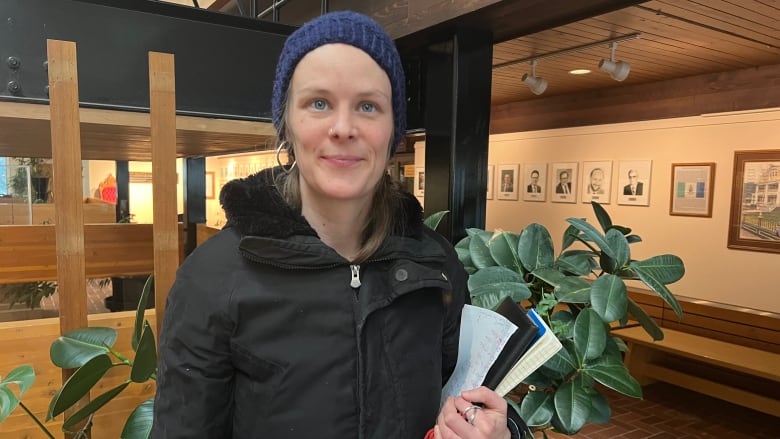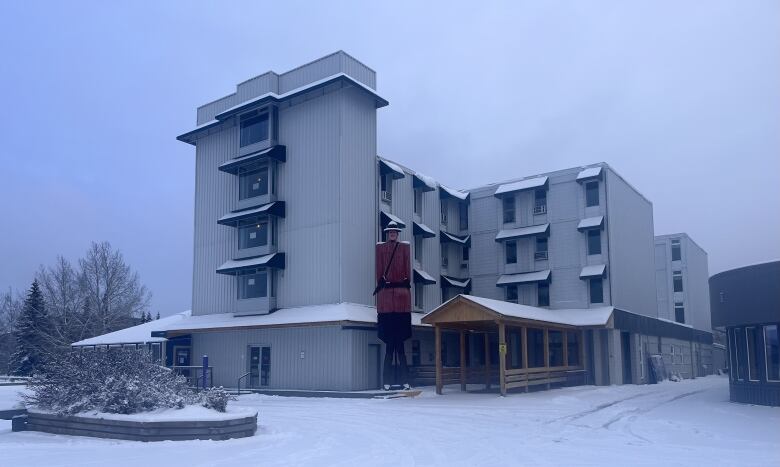Whitehorse needs campsite downtown for people experiencing homelessness, advocate says
Head of Safe at Home Society says city can be proactive by setting aside land for seasonal camping

The executive director of Yukon advocacy group Safe at Home says the City of Whitehorse could help the housing crisis by providing an area for people to legally camp in the city.
On Monday, Kate Mechan addressed city council to suggest that as an interim solution to a crisis she says is getting worse.
"We're seeing an increase in families experiencing homelessness, a 58-per-cent increase in the number of people who are feeling like they have no other option but to potentially camp," she told councillors.
Mechan said that there are at least 228 homeless individuals in Whitehorse, and she called on the city to take a more proactive approach by donating or setting aside land on a seasonal basis for them.
That would allow people who have no option but to camp to "do so with dignity and supports," she said.
Currently, this kind of encampment would be illegal.
"The city's bylaws don't allow camping in public open spaces," said cityspokesperson Oshea Jephson. "Camping is limited to designated camping areas, like Robert Service Campground."
A site at Robert Service Campground, just outside the city's downtown, is$36.75 per night.
Camping for survival
Speaking tocouncillors, Mechan cited a 2020 report from the UN Special Rapporteur on the right to adequate housing.That report statesthat international human rights law prohibits governments from removing residents from encampments without meaningful engagement and identifying alternative places to live that are acceptable to them.
Mechan asked councillors to recognize that many people are forced to campfor survival.
"We know that bylaw services is complaint-driven," she said. "It seems to prioritize the needs and safety of property owners and business owners over those who are made vulnerable through their experiences of poverty and oppression."
On May 1, at least 20 residents who had been living at the Safe at Home Society's temporary housing option, the former Coast High Country Inn in Whitehorse, were required to vacate in order to allow for extensive renovations to the building. The goal is for the former hotel to offer more than 60 supportive housing units.

Patrick Lethbridge is a longtime Whitehorse resident who sometimescamps because of housing insecurity.
"I'm couch-surfing, going from couch to couch and staying at the shelter if I absolutely need to, 'cause it's not really my favourite place to be," he said, referring to Whitehorse's emergency shelter at 405 Alexander.
"It's just a really hostile environment, there's a lot of fighting and a lot of aggressive people. It's hard to sleep there at night."
When he camps, Lethbridgedescribes having to hide from police and worry about safety.
He likes the idea of a designated seasonal camping area in the city, although he says camping comes with its own challenges.
"It does get cold at night," he said.
Site should be central, Mechan says
As part of her appeal to the city, Mechan told councillors that municipalities across the country are exploring viable alternatives to encampments for those who feel unsafe in shelters. She cited examples in Halifax, Kelowna, B.C., andPeterborough and Kitchenerin Ontario.
But those cities are offering residents more than a plot of land they've constructed temporary tiny homes.
WhenCoun. Michelle Friesen asked whether Mechan had a plot of land in mind, Mechan suggested the dirt bike track across from the Robert Service Campground.
"I would strongly encourage us to consider how important it is that something like this be central, so people can continue to access the medical and support services that they need in the downtown core," Mechan said, noting that the Ta'an Kwach'an Council andKwanlin Dn First Nation would need to be consulted.
Speaking to CBC after council, Friesen had said she had mixed feelings about the proposal.
"I'd really love to support a more dignified option for people experiencing homelessness than an out-of-sight, out-of-mind mud bog for people to put a tent up in," she said.
Friesen sees raising downtown building heights, addressing under-utilized downtown lots, and introducing short-term rental regulations as higher priorities to address the housing crisis.
"But if there are over 200 people including families and children that are living in uncertainty, and if supporting this gives them even a little bit of certainty while they're struggling with homelessness, then I would," she said.
With files from Andrew Hynes












_(720p).jpg)


 OFFICIAL HD MUSIC VIDEO.jpg)
.jpg)



























































































